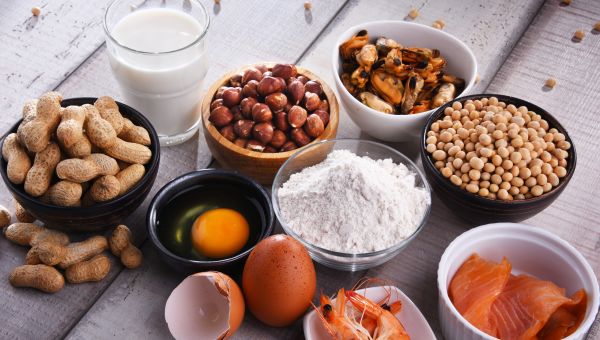Rheumatoid Arthritis: 7 Diet Do's and Don'ts
See if a change in diet can help your RA symptoms.

There's debate over how foods affect people with rheumatoid arthritis (RA), but most research points to a nutritious, well-balanced diet as a vital part of managing RA symptoms and overall health. The National Institute of Arthritis and Musculoskeletal and Skin Disease (NIAMS) advises people with RA to get enough—but not an excess—of calories, protein, and calcium. There's no one-size-fits-all diet, but certain foods may reduce inflammation and improve RA symptoms. Since each person with RA responds differently, consider these RA diet do's and don'ts to help determine what works best for you. Consult your healthcare provider before making drastic diet changes or taking supplements.

DO: Eat a Mediterranean-Style Diet
Rich in fruits, vegetables, and whole grains, a Mediterranean-style diet is packed with antioxidants and phytonutrients that fight inflammation. "A Mediterranean diet is likely to have the best health-promoting benefits for people with RA," says Lona Sandon, RD, a registered dietitian who has RA. Mediterranean meals are also loaded with healthy unsaturated fats from olive oil, nuts, and fatty fish, which help maintain good cholesterol levels. This is especially important for people with RA, who are at higher risk for cardiovascular disease. Another perk? Mediterranean diets can help people slim down, which means less weight to strain your joints.

DON'T: Overdo Your Sugar Intake
Sugars increase your body's acidity levels, raise your risk of high blood pressure, and promote inflammation. Too much sugar can also weaken your immune system by causing white blood cells to stop fighting infection. The crash that often follows a "sugar high" may worsen fatigue symptoms in people with RA. To avoid these consequences, remove refined sugars from your diet, and reduce your overall intake as much as possible.

DO: Eat Enough Omega-3s
Omega-3 fatty acids have long been hailed for their heart-boosting benefits. Evidence suggests omega-3s may also reduce joint stiffness and arthritis pain because of their anti-inflammatory effects, though more research is needed to confirm the current understanding. These fatty acids are found primarily in cold-water fish such as salmon, herring, mackerel, and tuna. Other good omega-3 sources include flaxseed, tofu, and walnuts. As for fish oil supplements, research shows the benefits aren't the same. In fact, supplements may interact with certain RA medications, according to the Johns Hopkins Arthritis Center. Until more is known, it's best to put more omega-3 rich foods on your plate instead.

DON'T: Eat Too Much Red Meat
Studies suggest people who eat more red meat increase their risk of developing RA or worsen existing RA symptoms. The reason? "Eating more red meat increases pro-inflammatory proteins," says Grant Cooper, MD, author of The Arthritis Handbook: Improve Your Health and Manage the Pain of Osteoarthritis. Red meat is packed with omega-6 fatty acids, which break down to pro-inflammatory proteins in the body. "If there is a causal relationship between red meat and rheumatoid arthritis, it is probably associated with the collagen in red meat or perhaps some other substance that triggers an immune response," Cooper says. If you have RA and are a red meat lover, consider healthier protein sources.

DO: Check for Nutrient Deficiencies
People with RA often have nutrient deficiencies because of RA or RA medications. The most common deficiencies in people with RA are folate, vitamin C, vitamin D, vitamin B6, vitamin E, calcium, magnesium, zinc, and selenium, according to the Johns Hopkins Arthritis Center. Selenium and vitamin E are inflammation-fighting antioxidants that protect joint linings, while calcium and vitamin D lower risk for osteoporosis. Kelly Young, creator of RA Warrior, encourages people with RA to check with their healthcare providers and consider lab tests to check for any imbalances.

DON'T: Ignore Food Allergies and Sensitivities
Some people with RA find that certain foods or food groups may trigger flares. Avoiding these foods may have short-term benefits and improve RA symptoms. The Johns Hopkins Arthritis Center advises that milk, meat, and processed foods are common suspects. One method to determine food sensitivities is an elimination diet, where certain foods are removed from your diet and slowly reintroduced. But not all experts recommend this. Instead, Sandon suggests keeping a food and symptom journal for 6 to 8 weeks to determine which foods seem problematic. Work with a healthcare provider, registered dietitian, or nutritionist to develop a safe action plan.

DO: Drink Alcohol in Moderation
A glass of wine with dinner or an occasional alcoholic beverage may actually lower RA risk, according to some studies. Though more research is needed to understand alcohol's effects on RA, evidence suggests moderate alcohol consumption may suppress the immune system and influence how RA develops. For people with RA, moderate alcohol consumption may have anti-inflammatory effects that may ease RA symptoms. The key is moderation, which the Centers for Disease Control and Prevention define as no more than two drinks a day for men and no more than one drink per day for women. If you are taking medications, talk to your healthcare provider about alcohol and its effects to avoid complications.
More On


video

article

slideshow


video


video
